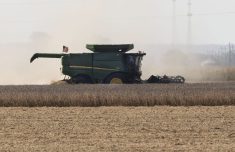The deadly pig virus porcine epidemic diarrhea has been discovered in an Ontario pig barn, the first positive case in Canada.
The source of the virus is unknown, but Ontario’s chief provincial veterinarian said investigators are retracing the activity of trucks, people and animals on the southwest Ontario farm.
“In terms of an absolute source of infection, it is not clear and as we’ve seen in other investigations in North America, often at times it isn’t clear,” said Dr. Greg Douglas.
The piglets began to scour Tuesday and the farmer contacted his veterinarian immediately. The samples were confirmed positive with PED by the pathology lab the following day and confirmation announced Jan. 23.
Read Also

Alberta harvest wrapping up: report
Harvest operations advanced to 96 per cent complete in Alberta as of Oct. 7, with only a few late-seeded cereal and canola fields remaining, according to the latest provincial crop report.
“There was rapid onset of vomiting diarrhea and mortality in very young piglets. It’s consistent with what we’ve seen in the US with mortality, The reports that we have that inside the barn is, mortality in the very young piglets is approaching 80 to 90 percent,” said Douglas, of Guelph.
“In the U.S. context they’ve seen millions of young piglets succumb to this virus.”
Amy Cronin, chair of Ontario Pork, said while Canadians have known the disease would eventually find its way across the border, it’s a different sensation when it shows up in the next county.
“It makes your stomach unwell for awhile,” said Cronin, who has a pork operation in Huron County, directly next door to Middlesex County where the disease was found.
Southwestern Ontario is heart of Ontario’s $523 million pork industry.
Cronin said she doesn’t know what the discovery of PED will mean for the industry in the long term, but pork industry and government officials are working hard to contain the virus on the farm.
“We know it is a very contagious disease and it thrives in the cold,” she said.
PED is not a reportable disease in Ontario and there will be no compensation paid to the farmer for losses.
The virus does not affect food safety and poses no risk to human health or other animals.
Alberta Pork executive director Darcy Fitzgerald said the news of PED in Ontario underlines the need for pork producers everywhere to be vigilant with biosecurity at all time.
Douglas didn’t know if Canadians would be able to contain the disease better than the Americans, but Canadian pig farmers have learned a lot from watching the disease spread through American pig barns over the last nine months.
“Our messages of being vigilant and being aware have fallen on fertile ground. I wouldn’t necessarily say our industry is any better. It has the luxury of having watched the expanding epidemic in the U.S. and making sure we’re following our biosecurity protocol and improved communication,” he said.
“We’ve had luxury of doing all that over the course of 2013 while the Americans were busy cleaning up piles of dead pigs in their barns, unfortunately for them.”
















